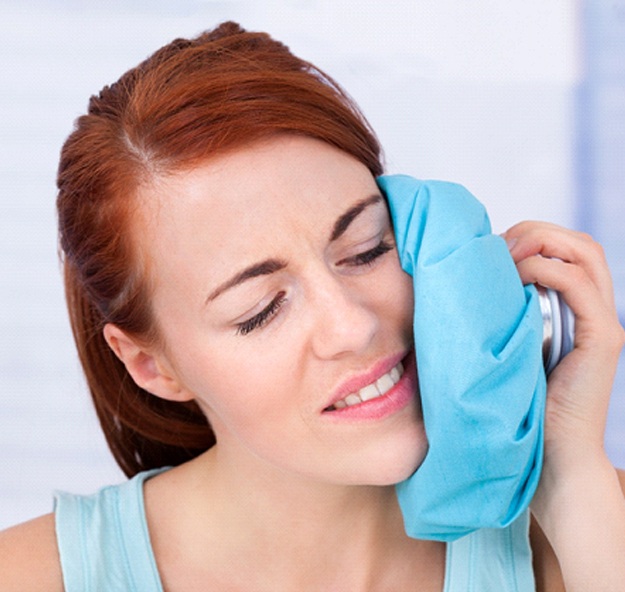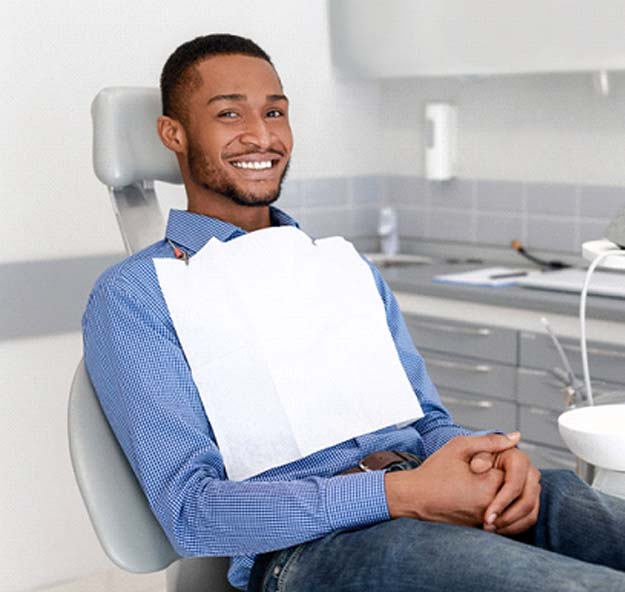Tooth Extractions – Norton Shores, MI
Say Goodbye to Trouble Teeth
It’s not generally anyone’s first choice to lose a tooth, but sometimes an extraction is the best option to maintain the health of the rest of your smile. Extractions are never your dentist’s initial pick, but in some situations, the preservation of your oral health depends on it. Our dentists at Laketown Family Dentist offer tooth extractions to put an end to problem teeth before more serious issues occur. To learn more about tooth extractions in Norton Shores or to schedule an appointment, give our office a call!

Why Choose Laketown Family Dental for Tooth Extractions?
- Same Day Emergency Appointments Available
- Dentists Are Fellows of the Academy of General Dentistry
- We Work with Numerous Dental Insurance Providers
Reasons Why Tooth Extractions Are Necessary

When possible, we always do our best to help patients keep their natural teeth, but sometimes this simply isn’t a viable option. Here are some of the situations where a tooth extraction can help to improve your oral health and the function of your smile:
- To allow for a patient to undergo orthodontic treatment and maintain the final results
- When a child’s baby tooth won’t fall out naturally on its own
- When a tooth is impacted and unable to completely erupt properly
- For ensuring long-term success with a restoration, like a full or partial denture
- There is severe damage or decay to the tooth that cannot be repaired
By extracting problem teeth, future infections and other oral health issues are significantly less likely to occur later on.
The Process of Removing a Tooth

Most of the time, teeth are removed by pulling or surgical extraction. Teeth can only be “pulled” when they have fully emerged from the gumline. In this case, the area will be numbed around the tooth, and we will use a clasping tool to shift the tooth around until it breaks away from the gumline. When pulling isn’t a possibility, the tooth will need to be surgically removed. For this procedure, a small incision is made in the gums to allow us the ability to reach the tooth and remove it.
In order to determine which extraction method is necessary for you, come see us for a consultation. During this time, we will thoroughly evaluate your situation. If it pertains to you, we will also discuss potential tooth replacement options to prevent oral health problems related to tooth loss, like jawbone deterioration and misalignment issues.
Tooth Extraction Aftercare

Before you leave the office, we will provide you with a detailed aftercare plan to help you stay comfortable and avoid complications. You can always give us a call if you have any questions. Here are some of the steps that are typically recommended for optimal recovery:
- Rinse the mouth with saltwater 24 hours after your procedure to clean the site.
- Take recommended over-the-counter and prescribed medication as directed.
- When sleeping, lay down with your head propped up on pillows.
- Get plenty of rest for optimal healing.
- Apply a cold compress or ice pack to reduce swelling and discomfort.
- Stay away from hard, crunchy, and sticky foods.
- Do not drink using a straw.
- Avoid using tobacco products until your mouth has completely healed.
Tooth Extractions FAQs

Getting a tooth pulled can sound scary, but rest assured that at Laketown Family Dental, we strive to ensure your experience is as gentle and comfortable as possible. That being said, we understand that you might have a few apprehensions about your procedure. We’ll always take the time to address your concerns when you visit us, but to make things easier for you, we’ve included the answers to some of the questions about tooth extractions that we get asked the most often.
How Should I Prepare for My Tooth Extraction?
As important as it is to follow all of our tooth extraction aftercare guidelines, it’s equally crucial to prepare beforehand. If you’re unclear about even the smallest of details regarding your extraction, we urge you to ask us. After all, we want you to feel confident and well-informed about your treatment.
Depending on your specific circumstances, we may give you instructions like fasting the morning of or picking up your prescription medication beforehand. You should also arrange for a friend, family member, or someone else you trust to drive you to and from our office, as you won’t be able to drive after receiving anesthesia.
Does Getting a Tooth Extracted Hurt?
Many patients are understandably worried about their tooth extraction being painful. Luckily, regardless of the type of extraction you’re receiving, the first step in the treatment is always the same: numbing your mouth with local anesthetic. During your procedure, you may feel a slight pressure when the tooth is removed, but you shouldn’t experience outright pain.
There will most likely be some soreness during the recovery process, but this should only last for a few days. To minimize your discomfort, it’s important to follow our aftercare instructions to a T. You should also call us right away if your pain starts to worsen instead of subsiding.
What Can I Do to Speed Up Healing Time After a Tooth Extraction?
After your tooth extraction, it’s important to focus on resting. Strenuous physical activity can divert blood away from your mouth, which causes your body to take longer to heal. Avoid exercise for at least 24 hours.
The other essential element of recovering from a tooth extraction is to avoid disturbing the blood clot that forms over the site. Right after your procedure, we’ll instruct you on how (and how often) to change your gauze pads to slow bleeding and allow the clot to develop. Do NOT do anything that could dislodge the clot, such as smoking, drinking through a straw, blowing your nose, or spitting forcefully.
Can I Leave the Space Empty After a Tooth Extraction?
If the tooth that is getting extracted is located in the back of the mouth, you might wonder if there’s any point in replacing it since no one will see the empty space. However, every single tooth contributes to the health of your overall smile. Even one missing tooth can cause the others to drift out of alignment, resulting in bite problems, discomfort, and difficulty chewing. For that reason, we recommend that once you finish healing, you schedule an appointment with us so that we can discuss your options for replacing the tooth.
 (231) 737-2273
(231) 737-2273

 Appointment
Appointment